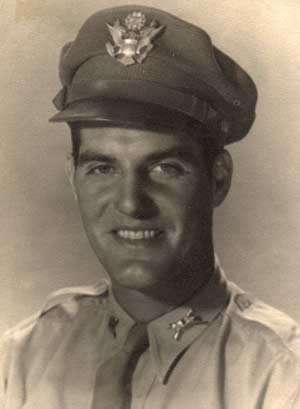|
Moderated by NW Okie! |
Volume 10 , Issue 302008Weekly eZine: (374 subscribers)Subscribe | Unsubscribe Using Desktop... |
WWII & major Robert L. McGill - Jade To Jasmine

It was in April, 1945, that our Uncle Robert McGill made the headlines in the local newspaper in Alva, Oklahoma. The headlines read: Combination of 'Jasmine' & 'Jade' - Capt. M'Gill Blast Nazis."
With the 75th Division in Germany, American air support meshed with American infantry to pulverize German resistance in the industrial Ruhr valley.
The scene was an air support liason office which had direct radio communication with a flight of P-47s. There is also a direct telephone wire with front line infantry regiments. The 291st infantry had just run into a German counter-attack and requested air support to help break it up.
Captain Ray C. Langford, Hillsboro, Texas, was acting as air ground co-ordinator, and took the microphone. "Jade to Jasmine 4 ... Jade to Jasmine 4 ... Come in ... We have a mission."
It might have sounded like gibberish to some, but actually it meant another pounding for the German troops already harrassed to the breaking point.
Jasmine was the radio call word for a flight of P-47s, four is the flight leader. Their specialty was strafing and dive bombing.
Jade, in this case, Captain Robert L. McGill of Alva (OK), explained the mission to Captain Langford who repeated it to the flight leader.
"On your map," Langford tells the flight leader, "find the double-track railroad. Follow it along to the outskirts of West Dormund. On the right of the tracks, going in, you should see a group of 8 or 10 houses. Bomb the houses and go in for low level strafing. That is the enemy assembly point. We especially want to knock out all vehicles in the area. Do not work the left side of the tracks. That is where our troops are dug in. I repeat, do not work the left side."
Over the radio came a "Roger Wilco" which indicated that the flight leader understood and would comply.
Captain McGill tells the infantry commander that the planes were coming in for their run and that the boys holding the left side "better dig in until the show is over."
There is a few minutes silence, then one pilot says "Flak." Just the one word, but the others would mark the burst and try to spot the gun pit on the ground.
Next, from Jasmine 4 they hear "Bombs away." then, "Now we go in for the homework."
"Flak," the same pilot said again.
"For Christ sakes quit hollering 'Flak.'We know there's flak."
Captain Langford breaks in: "Do you find any vehicles?"
"No Vehicles," Jasmine 4 reports, "Shall we fly through a couple of garages? They may be parked inside."
"Just work 'em over good a couple of times," Langford tells him.
"I've been hit," Jasmine 4 says."I'll have to pull out for the base." Langford orders the flight on a homeward course, then tries to summarize the results. It's a wonder to those listening how he can concentrate on the results. Flying a plane that has had a flak message should be an all-consuming task. But Jasmine 4 believes in winding up the mission in a workmanlike manner.
"All houses in the target area are flat. No vehicles in the area. Our strafing scattered at least two battalions of enemy troops. Noticed gun positions about a half-mile due south of the target. Also numerous road blocks on all routes leading into Dormund. That is all Jasmine 4 out."
Captain McGill calls the infantry commander and told him the strong point has been worked over. It took just 33 minutes from the time that the infantry commander requested air support.
It was May, 1945 that Captain Robert L. McGill made it to the rank of Major from Captain.
| View or Add Comments (0 Comments)
| Receive
updates ( subscribers) |
Unsubscribe
| © . Linda Mcgill Wagner - began © 1999 Contact Me | |
